Untested but should work like the following:
beginning_of_month = Time.current.beginning_of_month
end_of_month = Time.current.end_of_month
# Let's get first all orders count group by user + clinic
users_per_clinic_orders_count_since_beginning_of_month = Order.where('created_at >= ? AND created_at < ?', , beginning_of_month, end_of_month).group(:user_id, :clinic_id).count
users_per_clinic_orders_count_since_three_months_ago = Order.where('created_at >= ? AND created_at < ?', , beginning_of_month - 2.months, end_of_month).group(:user_id, :clinic_id).count
users_per_clinic_orders_count_since_six_months_ago = Order.where('created_at >= ? AND created_at < ?', , beginning_of_month - 5.months, end_of_month).group(:user_id, :clinic_id).count
users_per_clinic_orders_count_since_last_year = Order.where('created_at >= ? AND created_at < ?', , beginning_of_month - 11.months, end_of_month).group(:user_id, :clinic_id).count
# Now Let's get all users JOINED with clinics into memory
users = User.joins(:clinics).select('id', 'clinics.name')
data = {}
# Set data with (key == [user_id, clinic_id]) with the corresponding table columns
# All of this should be fast as all of these objects including user and clinic records are already in memory
# data[[user_id, clinic_id]][0] means "id" column
# data[[user_id, clinic_id]][1] means "clinic name" column
# data[[user_id, clinic_id]][2] means "last order at" column
# data[[user_id, clinic_id]][3] means "orders 1 Month" column
# data[[user_id, clinic_id]][4] means "orders 3 Months" column
# data[[user_id, clinic_id]][5] means "orders 6 Months" column
# data[[user_id, clinic_id]][6] means "orders 12 Months" column
users_per_clinic_orders_count_since_beginning_of_month.each do |(user_id, clinic_id), orders_count_since_beginning_of_month|
if data[[user_id, clinic_id]].nil?
user_in_memory = users.detect { |user| user.id == user_id }
next unless user_in_memory # ignore if this user_id is not part of `users` (joined with clinics)
clinic_in_memory = user_in_memory.clinic
next unless clinic_in_memory # ignore if this clinic_id is not part of `users` (joined with clinics)
end
data[[user_id, clinic_id]] ||= []
data[[user_id, clinic_id]][0] ||= user_in_memory.id
data[[user_id, clinic_id]][1] ||= clinic_in_memory.name
data[[user_id, clinic_id]][3] = orders_count_since_beginning_of_month
end
users_per_clinic_orders_count_since_three_months_ago.each do |(user_id, clinic_id), orders_count_since_three_months_ago|
if data[[user_id, clinic_id]].nil?
user_in_memory = users.detect { |user| user.id == user_id }
next unless user_in_memory # ignore if this user_id is not part of `users` (joined with clinics)
clinic_in_memory = user_in_memory.clinic
next unless clinic_in_memory # ignore if this clinic_id is not part of `users` (joined with clinics)
end
data[[user_id, clinic_id]][0] ||= user_in_memory.id
data[[user_id, clinic_id]][1] ||= clinic_in_memory.name
data[[user_id, clinic_id]][4] = orders_count_since_three_months_ago
end
users_per_clinic_orders_count_since_six_months_ago.each do |(user_id, clinic_id), orders_count_since_six_months_ago|
if data[[user_id, clinic_id]].nil?
user_in_memory = users.detect { |user| user.id == user_id }
next unless user_in_memory # ignore if this user_id is not part of `users` (joined with clinics)
clinic_in_memory = user_in_memory.clinic
next unless clinic_in_memory # ignore if this clinic_id is not part of `users` (joined with clinics)
end
data[[user_id, clinic_id]][0] ||= user_in_memory.id
data[[user_id, clinic_id]][1] ||= clinic_in_memory.name
data[[user_id, clinic_id]][5] = orders_count_since_six_months_ago
end
users_per_clinic_orders_count_since_last_year.each do |(user_id, clinic_id), orders_count_since_last_year|
if data[[user_id, clinic_id]].nil?
user_in_memory = users.detect { |user| user.id == user_id }
next unless user_in_memory # ignore if this user_id is not part of `users` (joined with clinics)
clinic_in_memory = user_in_memory.clinic
next unless clinic_in_memory # ignore if this clinic_id is not part of `users` (joined with clinics)
end
data[[user_id, clinic_id]][0] ||= user_in_memory.id
data[[user_id, clinic_id]][1] ||= clinic_in_memory.name
data[[user_id, clinic_id]][6] = orders_count_since_last_year
end
# Lastly we need to get the "last order at" to be inserted into each data[[user_id, clinic_id]][2]
# this is the only unnecessarily slower part as this do a N-times more sql per find_by
# (but couldnt think of a quick solution yet to eager load the last order created_at)
# Feel free to change this if you know a faster way
data.each do |(user_id, clinic_id), columns|
last_order = Order.order(created_at: :desc).find_by(user_id: user_id, clinic_id: clinic_id)
data[[user_id, clinic_id]][2] = last_order.created_at
end
# sort the table by [user_id, clinic_id] and then puts and show the table
puts data.sort.map do |(user_id, clinic_id), columns]
columns
end
# => [
# [1, Providence, 2019-08-14T15:51:12.342Z, 2, 6, 12, 24],
# [1, Joseph Center, 2019-08-22T16:26:29.151Z, 1, 3, 6, 12],
# [2, Eubanks, 2019-08-22T16:26:29.151Z, 1, 4, 8, 18],
# ...
# ]
